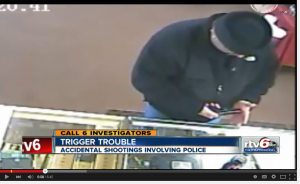This is really about firearms, but let’s start by discussing the spellcheck problem.
“Dew knot trussed yore spill chick two fined awl yore missed aches.”
Some people do not recognize the word discreetly when it is spelled and used correctly. These people often default to using discretely — which is a different word entirely, with a separate (and dare I say, discrete) meaning from the first word.
This is the type of error that the spellcheck program will not catch. The person used a valid word even though it is not the one the person intended to use. Spellcheck can’t help with that. Grammar check rarely catches this type of error either.
But that’s not the real problem.
Here’s the real problem: People rarely, if ever, spot our own errors of this type. We can’t! Telling us to proofread our work, or to check our spelling, will not help us find this type of confident mistake. We cannot see the error because we don’t realize it is an error. If we knew the right word, we would probably have used it in the first place. So we cannot see the error when we proofread what we wrote, either. We see only that the document says exactly what we intended to write. Must not be any mistakes here!
While we accurately see the word, we simply cannot see the mistake in its use.
A discreet check of the dictionary would show us the error in our thinking. But when someone has made a mistake of this type, we never think to check the dictionary, because we don’t feel any insecurity in our word choice. We may even discreetly try to “correct” another person’s spelling, because we are so very confident in how we spelled the word and the spellcheck never told us otherwise.
The spellcheck problem is a different one than a simple typo. A typo is usually just fumbly fingers — typing teh instead of the, or well instead of we’ll. The first type of mistake can be caught by spellcheck, and the second is usually caught on the re-read, because most of us can easily see the difference between the word we intended to use and the word that appears on the screen.
But a person who uses the wrong word or phrase because they are fully convinced they are using the right one, cannot be helped by spellcheck. And they cannot find the mistake when they read the work themselves, either.
What we “know” gets in the way of what we need to see.
And … Firearms?
This is an exact analogy to asking people who don’t know about gun safety to check each other for safe gunhandling on the range. Very few people actually intend to put themselves or anyone else at risk with the way they handle a gun. Instead, most people who handle guns unsafely do so because they don’t realize they’re doing it, and also because they don’t know how to not do it.
This is also why so many bad gunhandlers get offended when someone else makes a comment about how they handled the gun. They honestly don’t believe they have done anything wrong. If they knew they were endangering themselves and others, they most likely would not have done it. You have just accused them of doing something they know they would never do, because they’re not the kind of person who would or could kill someone else without meaning to.
They pointed the muzzle at you, or at themselves. Maybe they had their finger on the trigger when it should not have been. But they did not know that they had done that. Or (perhaps worse) they did not realize that doing things that way could be a problem.
People don’t notice when the dude at the gun shop points the gun at his own left hand, because they don’t know to look for it. Or because they think it’s no big deal as long as the gun is unloaded.
They don’t notice when someone points the gun into their body core as they reholster, because they don’t realize that’s a problem in the first place. Or they know it could be a problem, but they don’t realize they’ve done it themselves because it does not feel as dangerous as it looks when someone else does it.
People don’t realize they are using the decocker incorrectly, or failing to use the thumb safety at the appropriate times, or sweeping everyone to the left of them as they put the gun into their range bag.
Sometimes, they have a sense that maybe they need to do something differently — so they move more quickly as they do all of these things!
This is why even experienced shooters should attend a good class from time to time. We cannot spot the errors we make with full confidence. Just as we confidently type discretely when we mean discreetly, and never even feel the impulse to look it up since we “know” the word we used, the shooting mistakes we’ve been making with full confidence will never be corrected, unless we voluntarily ask a skilled and competent observer to help us find and fix them.
The confident-mistake problem applies just as much to shooting and gunhandling skills as it does to basic safety behavior. It isn’t only a beginner problem, but it applies to all of us at different times.
This is also why potential students should look very suspiciously at any program that has novices-watching-novices as a part of the safety protocols. People cannot see whole categories of our own mistakes, and naive observers are also unlikely to catch those same mistakes when others make them. Because of this, setting novices to watch novices may help the observers learn to see the errors, but it does little or nothing for safety among those who are handling the guns at the moment.






One Response to The Spellcheck Problem (Explained Discreetly)